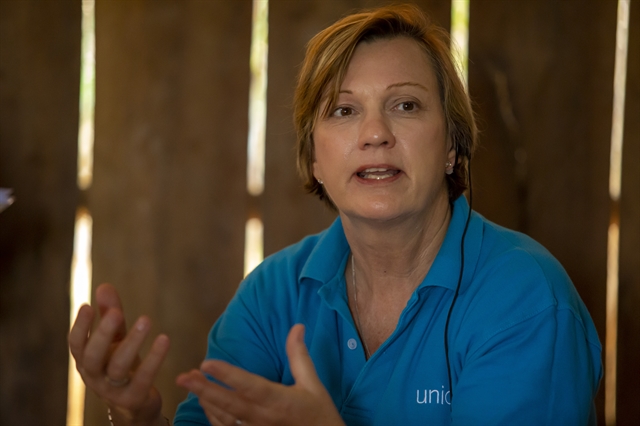 Society
Society


|
| Rana Flowers, UNICEF Representative in Viet Nam. — Photo Courtesy of UNICEF |
HÀ NỘI — Children’s charity UNICEF has praised the Vietnamese government for its compassion in helping children orphaned because of COVID-19.
Head of UNICEF Hà Nội, Rana Flowers, expressed her appreciate to the Ministry of Labour, Invalids and Social Affairs for their efforts, and said her organisation will do all it can to support the recently bereaved youngsters.
But she did warn that the best possible options must be found for each child.
More than 1,500 children have been orphaned in HCM City after their parents lost their lives through COVID-19.
“It is heartwarming to see the outpouring of support and the willingness of individuals and businesses to support the children,” she said.
“But, UNICEF cautions that it is absolutely crucial in such stressful and challenging times to ensure that the solutions chosen are in the very best interests of the child, designed to keep children connected to their communities, placed in family environments where they can grow and prosper.”
According to the official, the immediate and long-term damage caused by family separation and placement in institutions on children was well documented, in countries of this region and the world.
Instead of placing children in orphanages, better options are to find suitable families for them, and allow them to remain in their own communities and attend schools with their established network of friends.
Rana added: “In trying to do good, some assume that a cold roof over their head is the only solution. It is not.
“In fact, the Convention on the Rights of the Child, years of assessing institutionalised children, years of research, and sadly years of lost opportunities and lost development for children make it very clear that institutions and facilities are not the right or even a safe place for children.
“We must work together as quickly as possible to find ‘family’ environments for the children.
“Children in institutions or facilities are regularly isolated from their extended families and local communities.
“Deprived of parental care, they more often endure physical, psychological, emotional and social harm – with consequences that last a lifetime. These children are also more likely to experience violence, abuse, neglect and exploitation.”
“To prevent and respond to this crisis for children in the immediate and long-term, it is vital that governments identify where possible extended families who are supported with the emotional, practical and financial support they need. Where this does not prove possible, then families ready to provide the love and support can and must now be found for each of the children, with Government supporting and monitoring the children as they grow.”
“As COVID-19 continues to devastate families and communities, we must protect every child’s right to live and grow up in an environment that supports their physical, psychological, social and emotional development.
Rana said that by placing youngsters in families, and not displacing them from the communities they are used to, then in the long-term, they can lead better lives.
“The call to action to ensure children can thrive in family-based care environments rather than in institutions matters now more than ever as the communities address unprecedented challenges caused by COVID- 19,” she said. — VNS





 Brandinfo
Brandinfo